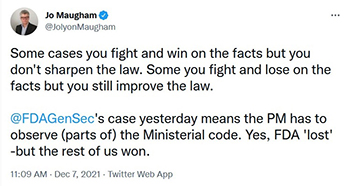A significant step forward
Scott Dobson outlines why the FDA chose to launch a legal challenge to the Prime Minister’s decision that the Home Secretary did not breach the Ministerial Code, and how the Court came to its rejection of the idea that there are different standards for ministers than for civil servants.

In 2020, the FDA launched legal proceedings after the Prime Minister ruled that the Home Secretary, Priti Patel, had not breached the Ministerial Code, despite being found to have bullied civil servants, on the grounds that she did not intend to bully. The FDA maintained that the Prime Minister’s decision did not meet the obligations of the code, and indeed his own foreword to the document which explicitly states “there will be no bullying and no harassment”. The judgement in the case, which was finally delivered in December 2021, made clear that a lack of intent is no excuse for bullying, and that the provisions on bullying, harassment and discrimination in the code could be challenged in the courts.
Bullying allegations and Cabinet Office investigation
On 29 February 2020, Sir Philip Rutnam resigned as Permanent Secretary at the Home Office, following what he called a “vicious and orchestrated” campaign of briefings against him. He also revealed that he had received allegations about the conduct of the Home Secretary that included “shouting and swearing, belittling people, making unreasonable and repeated demands.”
In the days that followed, the government announced that the Cabinet Office had been tasked with investigating the allegations made, with then-Minister for the Cabinet Office Michael Gove promising at the despatch box that matters would be concluded swiftly, to ensure “that no justice is delayed, and no justice is denied.” However, it would not be until November 2020 that the outcome of the investigation and the advice of the Prime Minister’s independent adviser on ministers’ interests, Sir Alex Allan, would be made public. The FDA would later learn during the subsequent legal proceedings that the Prime Minister had actually been in possession of the report for many months before acting on its findings.
Sir Alex’s report was clear that some of the Home Secretary’s reported behaviour amounted to bullying under the Ministerial Code: “The Home Secretary has not consistently met the high standards required by the Ministerial Code of treating her civil servants with consideration and respect. Her approach on occasions has amounted to behaviour that can be described as bullying in terms of the impact felt by individuals. To that extent her behaviour has been in breach of the Ministerial Code, even if unintentionally.”
However, the final decision on whether the code had been breached rested with the Prime Minister, and he determined there had been no breach and expressed his “full confidence” in the Home Secretary, prompting Sir Alex’s resignation as independent adviser. Speaking at the time, FDA General Secretary Dave Penman reflected on the “complete absence of political leadership and moral authority” from the Prime Minister. Penman highlighted the “two resignations on principle at either side of this sorry affair”, arguing that he could not believe that the Prime Minister did not “understand how civil servants will view his decision to ignore the evidence that the Home Secretary bullied her staff and, as such, breached the Ministerial Code”.
Reiterating the FDA’s longstanding call for reform to the system for investigating complaints against ministers, Penman condemned the decision taken, particularly in light of the words of the Prime Minister’s own foreword to the Ministerial Code, that “there must be no bullying and no harassment”:
“The Prime Minister, who is also Minister for the Civil Service, has made a clear choice… despite the evidence, despite his own words in the foreword to the Ministerial Code, despite the resignation of his adviser on the code, the Prime Minister chose political convenience over his moral and constitutional obligations to the civil service and the country.”
Launching legal proceedings
As it became clear that civil servants could no longer have confidence that allegations of bullying or harassment against a minister would be dealt with fairly or impartially, the FDA launched legal proceedings seeking to quash the Prime Minister’s decision via a judicial review, with the union arguing that if left unchallenged, the “perverse decision” would leave civil servants exposed to bullying behaviour by some of the most powerful people in the country. Indeed, the FDA’s own survey data of some of those working most closely with ministers showed that 85% of Senior Civil Servants and 90% of those on the Fast Stream had no confidence in the Ministerial Code as a mechanism for addressing concerns about bullying and harassment.
In taking this action and embarking on an undoubtedly complex legal challenge, the union was clear that it was not about interfering with the Prime Minister’s power over ministerial appointments and dismissals. The challenge instead centred on the issue that he took the decision that there had been no breach of the Ministerial Code, despite the facts that were established and presented to him, and which he did not challenge.
As a first step in taking legal action, the FDA was obliged to issue a pre-action protocol letter, setting out where the union believed the Prime Minister had erred in law and providing an opportunity for him to reverse his decision:
“[The decision] sets a damaging precedent which gives carte blanche to the kind of unacceptable conduct which the Home Secretary was found to have committed. No doubt it will be relied on by other ministers in the future, to argue that (for example) an apology after the event or a lack of awareness or intention to injure at the time means that bullying or unacceptable conduct has not taken place at all.”
The response received from the government failed to address the concerns raised by the FDA or to satisfactorily address what definition of the word “bullying” the Prime Minister had used when reaching his decision. They argued that the meaning of the word in the Ministerial Code was not intended to match that applied to civil servants or in other policies and procedures. As the union made clear in its submission to the courts, this “implies the term bullying, harassment and discrimination in the code mean whatever the Prime Minister wants them to mean – an impossible argument”.
Hearing and judicial review
At a hearing in April 2021 at the Royal Courts of Justice, the FDA was granted permission to proceed to a full judicial review to consider the facts of the case. At this hearing, the government set out its argument that the Ministerial Code was an entirely political document that could not be justiciable – in other words, could not be determined by a court of law. The FDA’s legal team rejected this, arguing that, as the implications for civil servants of decisions taken under the code were so serious, it had to be governed by external norms of interpretation and legal principle.
The FDA’s full application for judicial review was subsequently heard before Lord Justice Lewis and Mrs Justice Steyn over two days in mid-November 2021, with the union represented by Tom Hickman QC, Michael Ford QC and principle legal adviser Edward Cooper of Slater and Gordon. At the hearing, the FDA’s legal team set out the union’s argument that, in reaching his decision, the Prime Minister had misinterpreted the meaning of bullying in the Ministerial Code. The Prime Minister – without any explanation – had departed from the standard civil service definition of bullying, which Sir Alex Allan had applied in his findings, and decided that if behaviour was unintentional, it did not constitute bullying. The FDA argued strongly that this was at odds with the government’s own zero-tolerance policy on bullying. The union further argued that a finding by the court that the Ministerial Code was not justiciable would essentially mean that the Prime Minister was free to interpret the terms “bullying”, “harassment” and “discrimination” in any way that he sees fit – a situation with potentially very serious consequences for civil servants.
During the government’s response to the FDA’s arguments, the union also learned that the Cabinet Office had provided its report on the allegations against the Home Secretary to the Prime Minister as early as July 2020, nearly five months before he finally issued his decision. No explanation was offered by the government’s legal team for the delay. Penman argued after the hearing concluded that “it cannot be right that civil servants who make the difficult decision to come forward with evidence against a minister of bullying have the decision on that matter delayed for so long”. Reflecting on Michael Gove’s comments in the House of Commons back in March 2020 on concluding the investigation “as quickly as possible in the interests of everyone involved, so that we can concentrate on ensuring that no justice is delayed, and no justice is denied”, Penman added that “those words will ring hollow now to those civil servants who took the courageous step of coming forward to give evidence”.
Judgement: PM must “have regard to the law of the land”
Judgement was reserved at the end of two days of arguments, and was subsequently handed down at a final hearing on 6 December. Unexpectedly, the court found that the Prime Minister had not acquitted the Home Secretary of bullying in his decision, and his decision that the Ministerial Code had not been breached was instead a finding that he deemed no further action was needed on the matter. For that reason, the FDA’s judicial review was dismissed overall.
However, the judges’ findings represented a significant vindication of the FDA’s argument, finding that important elements of the Ministerial Code were indeed justiciable in the courts, and that the Prime Minister has a duty to correctly apply concepts such as bullying and harassment, with a lack of intent not a legitimate excuse. Reacting to the verdict, Dave Penman said: “All along the government has argued that the Ministerial Code did not set legal standards enforceable by a court and did not impose any legal obligations on the Prime Minister in relation to its interpretation. This has been rejected by the court.”
Speaking to the media outside the Royal Courts of Justice, Penman argued that the judgement represented a “significant step forward” in ensuring ministers are held to account for their conduct in the workplace – and that there was “no get out of jail free card” for ministers claiming a lack of intent. By agreeing with the FDA that the Ministerial Code was justiciable, the court had made clear that the Prime Minister had “to have regard to the law of the land”.
In subsequently deciding that no costs were to be awarded against either party in the case, the court further than acknowledged that while the government may have been successful in defending the case, the FDA had succeeding in establishing that parts of the code were justiciable and that “conduct which was offensive or intimidating could amount to bullying even where the person concerned was unaware of, or did not intend to cause, harm or offence”. The court concluded that, “in all the circumstances, the issues upon which the claimant [the FDA] succeeded are broadly equivalent to the success obtained by the defendant”.
Reflecting on the result, Dave Penman urged the government to take the opportunity for genuine reform of the Ministerial Code and the “opaque, politically vulnerable” procedures for dealing with complaints against ministers, making clear that the FDA was always willing to work with them to achieve that: “Any system for investigating bullying and harassment must have the interests of those subject to the abuse of power at its heart.”
The findings of the judicial review
Although the judicial review was dismissed overall, the findings of the court represent a clear rejection of the idea that there are different standards for ministers than for civil servants. Specifically, the court found:
- That the prohibition on bullying, discrimination and harassment in the Ministerial Code is justiciable in the Courts.
- That the Prime Minister must correctly apply those concepts when determining complaints against ministers.
- That it is not an excuse for bullying under the Code that a minister does not intend or is not aware of the upset and distress caused by their actions.
The court also found that no costs were to be awarded to either party, concluding that “in all the circumstances, the issues upon which the claimant [the FDA] succeeded are broadly equivalent to the success obtained by the defendant”.
FDA case is a “big win” in improving law

Influential legal figures emphasised the many positives in the result for the FDA, with Jolyon Maugham of the Good Law Project pointing out that the union might have fought and lost the case, but had still improved the law: “The PM has to observe (parts of) the Ministerial Code. Yes, FDA ‘lost’ – but the rest of us won.” Human rights barrister Adam Wagner described the finding that parts of the Ministerial Code were justiciable as a “big win” for the FDA.
In his Law and Policy blog, commentator David Allen Green argued that “this is a good example of a case which both sides can be seen to have lost – but one in which both sides can also be seen as having won. And the more significant victory, for transparency and accountability, is that of the FDA.”
Related News
-

FDA reiterates calls for a full independent bullying and harassment policy in the Senedd
Appearing before the Senedd Standards of Conduct Committee, FDA National Officer Jane Runeckles made clear that the process for dealing with bullying, harassment and sexual misconduct must be independent from MSs.
-

“Significant victory” for FDA members: MPs vote to introduce risk-based exclusion at the point of arrest
FDA welcomes MPs vote to introduce a formal mechanism to risk assess any MP at the point of arrest.
-

FDA calls on Senedd to implement “fully independent process for dealing with complaints of bullying, harassment and sexual harassment”
FDA Cymru|Wales has called on the Senedd to “implement a fully independent process for dealing with complaints of bullying, harassment and sexual harassment” made against MSs.